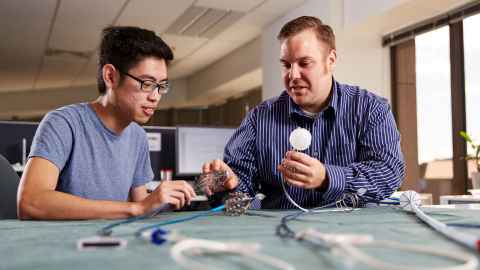About our lab
The TARGET Lab supports a range of research initiatives from the engineering benchtop through to clinical application.

The Laboratory for TrAnslational Research in Gastroenterology and Emerging Technologies (‘TARGET Lab’) was founded in early 2019 to facilitate translational research from engineering development to clinical application, specifically focused on improving in vivo research capabilities in the translational gastrointestinal research space.
The TARGET Lab now supports a range of research initiatives from the engineering benchtop through to clinical application. We have also grown to help other researchers realise their translational goals by facilitating collaborative pre-clinical trials for emerging medical technologies and innovations.
Endoscopic Gastric Electrical Mapping
Abnormal electrical activity, termed ‘dysrhythmias’, has been associated with a range of gastrointestinal disorders, offering promising potential diagnostic mechanisms. We are now pioneering endoscopic (i.e., down-the-throat) gastric electrical mapping as a novel minimally-invasive tool for measuring the electrical activation of the stomach, potentially offering a new diagnostic for severe stomach disorders.
Gastric Ablation
There is currently no proven therapy for correcting bioelectrical dysrhythmias in the stomach. We are developing gastric ablation as a potential therapy for dysrhythmias, where targeted energy is delivered to the dysrhythmic region to ‘burn’ the tissue and destroy the dysrhythmic pathway.
Gastrointestinal Physiology in Health and Disease
There remain many questions around the physiological mechanisms underlying gastrointestinal function. Our work toward developing new diagnostics and therapeutics often involves the development of novel techniques and technologies for measuring gastrointestinal physiology, which allows us to investigate key physiological questions as well.
New Advances in Translational Science
We are continually interested in new avenues of translational research and development, and routinely bring new techniques and technologies into pre-clinical development. We also collaborate with a number of other research groups to help them navigate the translational research pathway. We particularly specialise in in vivo pre-clinical validation and development, bridging the gap from technical development to clinical application.